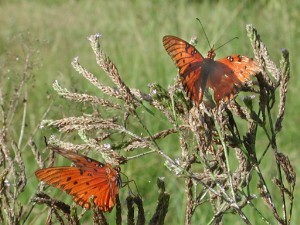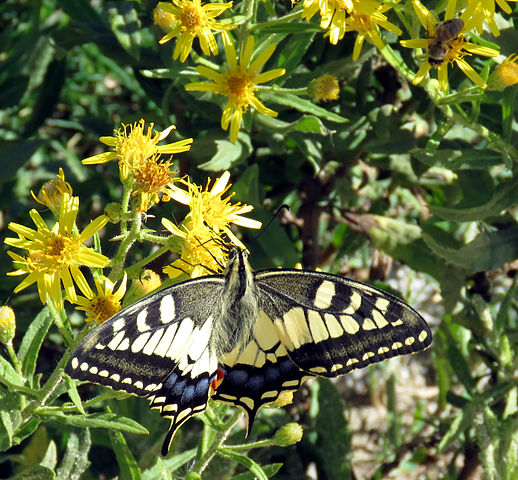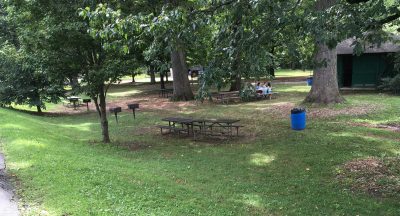Even if your street isn’t sprayed, don’t think you don’t need to take precautions!
A nearby DeltaGard applicator specialist working with Bayer products and with several decades’ experience in the business, but who does not wish to be identified, tells us the spray can drift 300 feet and does not tend to dissipate into the air. Of course, exactly where it goes depends on wind direction and speed. The manufacturer’s information documents high mosquito kill rates at 300 and even 400 feet.
A 2015 EPA memo (download here: EPA deltamethrin-mosquito-adulticide takes as well-founded Bayer’s “mortality” rate as “100% for deltamethrin, even at 300 feet from the point of application.”
This is why we are calling for a buffer zone of at least 300 feet around vulnerable non-targets, such as children in schools and day care centers, registered hypersensitive individuals, bee hives, and bodies of water where fish and amphibians are sickened or killed by pesticides. If mosquitoes are exterminated at that distance, the toxins are a danger to other species as well, including humans, and we know that smaller children are more vulnerable than most adults.
The above-mentioned mortality rate, as the EPA points out, is for “easily controlled” mosquito species as opposed to “those with more widespread resistance to organophosphates and/or pyrethroids.” Naturally, the more that mosquitoes are sprayed with a given pesticide, the more they become resistant to it. Such acquired resistance is a very good reason not to spray at all unless there is a serious health emergency, which becomes more likely as our climate warms and new-to-us mosquito-borne diseases move our way.
You can download the manufacturer’s (that’s Bayer) label for this product here: DeltaGard [label – mosquitos]. Note that this is specifically for the wide-area mosquito spray; other labels yo might see may pertain to other DeltaGard products.
The various DeltaGards all have deltamethrin as their active ingredient, but concentration and added ingredients may differ. See our earlier remarks on “turf and ornamental” DeltaGard here.
This is not easy reading but let’s focus on:
• to control adult mosquitoes, black flies, gnats, non-biting midges, stable flies, horse flies, deer flies, sheep flies, horn flies, and nuisance flying insects such as houseflies or blow flies.
It’s hard to love all those insects, but let’s point out that they are part of nature and are important food sources for birds, other insects, reptiles, and amphibians. And those others flying around outdoors have no health implications for people.
• For best results, apply when insects are most active and meteorological conditions are conducive to keeping the spray cloud in the air column close to the ground. An inversion of air temperatures and a light breeze is preferable. Application during the cooler hours of the night or early morning is recommended. Apply when wind speed is equal to or greater than 1 mph.
Who has an anemometer when you need one? If you do, please set it up if spraying occurs! And how do we tell if there is a temperature inversion (meaning warmer air over cooler air)? Of course, those who wish the spray to remain concentrated at ground level want an inversion; the rest of us would be happy with the normal pattern, causing the spray to dissipate more rapidly. Meteorological help needed!
ENVIRONMENTAL HAZARDS
This product is extremely toxic to fresh water and estuarine fish and invertebrates. Runoff from treated areas into a body of water may be hazardous to fish and aquatic invertebrates.
Do not apply over bodies of water (lakes, rivers, permanent streams, natural ponds, commercial fish ponds, swamps, marshes, or estuaries), except when necessary to target areas where adult mosquitoes are present, and weather conditions will facilitate movement of applied material away from the water in order to minimize incidental deposition into the water body. Do not contaminate water when disposing of equipment rinsate or wash waters.
When used for mosquito adulticiding;
This pesticide is highly toxic to bees exposed to direct treatment on blooming crops or weeds. Do not apply this product or allow drift when bees are foraging the treatment area, except when applications are made to prevent or control a threat to public and / or animal health determined by a state, tribal, or local health or vector control agency on the basis of documented evidence of disease causing agents in vector mosquitoes, or the occurrence of mosquito-borne disease in animal or human populations, or if specifically approved by the state or tribe during a natural disaster recovery effort.
Please record any application over or next to bodies of water! Let’s bear in mind the condition that “weather conditions will facilitate movement of applied material away from the water in order to minimize incidental deposition into the water body.”
Rain or thunderstorms will do the opposite: wash the pesticide, both airborne and deposited on streets and other drainage areas, downhill and directly into surface drainage. If you ever see that happen, please photo the drainage water with a time stamp. Those fresh water fish and invertebrates are important ecological factors!
















